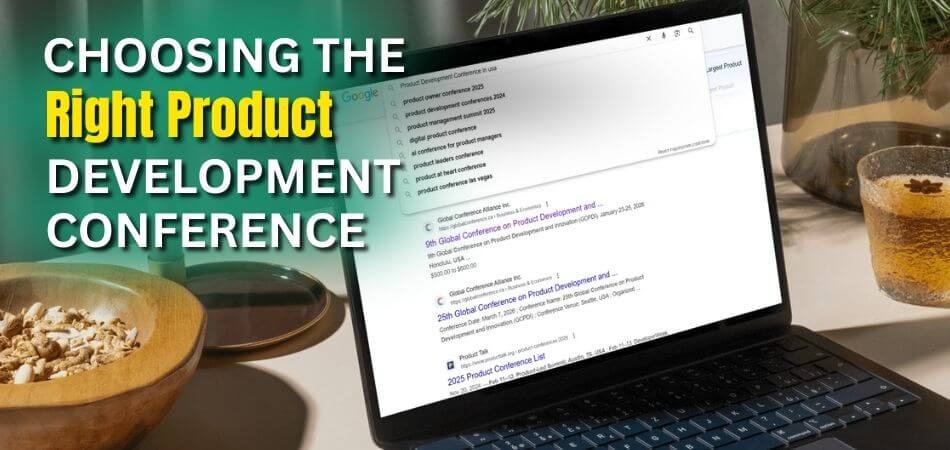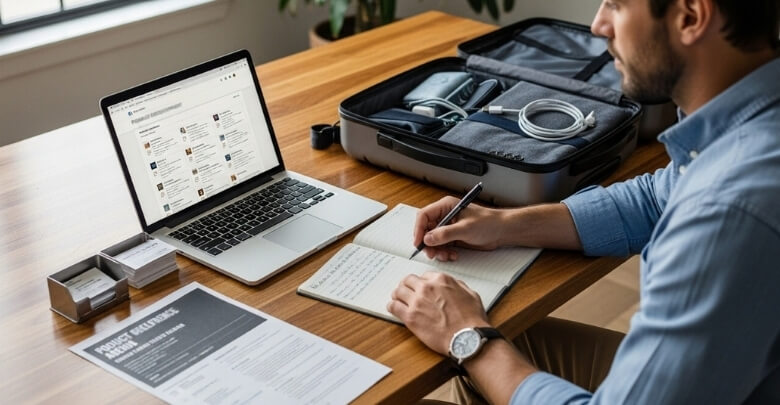Product development conferences bring together creative minds, top speakers, and real-life ideas under one roof. These events come in different styles, sizes, and formats depending on the goals of the organizer. If you’ve ever thought about joining one, you might find yourself asking, How do I choose the right product development conference for my needs?
To choose the right conference, start by knowing your goals, such as learning, networking, or building skills. Check the event’s focus, speaker list, agenda, and session types to match your interest and knowledge level. Consider location, format, and price to see if the value matches what you’re paying for.
Do you want to avoid picking the wrong event and wasting time? Then keep reading because this article covers everything you need to know from planning to making the final choice.
How Do I Choose the Right Product Development Conference for My Needs?
There are many product development conferences happening every year, each offering different themes, speakers, and networking chances. Picking the right one can feel tricky if you don’t know what to look for. Let’s go through some simple points to help you decide.

Clear Goals
Start by knowing what you want to achieve from the conference. Some people look for learning new skills, while others want to meet industry experts. If you are aiming for networking, pick events with strong community sessions. Having clear goals will make your choice easier.
Conference Focus
Not all product development conferences are the same. Some focus more on design, while others give importance to business strategy or technology. Check the theme and agenda carefully to see if it matches your interest. Choosing the right focus helps you get more value.
Speaker Lineup
The speakers are a big part of what makes a conference worth attending. Look for experienced professionals and leaders in product development. When you find talks from people you admire, you are more likely to learn useful lessons. A good lineup is always a strong sign.
Agenda and Topics
Check the schedule to see what topics will be covered. Go for a conference that offers sessions you find exciting or helpful for your work. Also, look at the technical knowledge requirements for attending a product development conference to be sure the sessions match your level. A balanced agenda with workshops, panels, or case studies can give you both knowledge and practice.
Networking Chances
Conferences are also about meeting people with similar interests. Look at whether the event has group discussions, meetups, or social sessions. These moments can help you build connections that last even after the event. Strong networking chances add great value to your experience.
Location and Format
Think about where the conference is happening and how it is held. Some are in person, while others are online or mixed. If you cannot travel, online options are good to consider. Choosing the right format helps you get the most from the event.
Budget and Value
Conferences can be costly, so compare the ticket price with what is being offered. Some events include meals, learning materials, or even post-event access to recordings. Make sure the benefits you get are worth the money you spend. A well-planned budget keeps things stress free.
Warning Indications of a False Product Development Conference
Not every event that calls itself a product development conference is real or worth your time. Some events are only made to collect money without giving any real value. These fake ones can waste both your time and money. Let’s look at how to spot the warning signs.
No Known Organizers
Real conferences are usually run by known companies, groups, or industry leaders. When there are no clear details about who is behind the event, that’s a red flag. A fake event often hides or gives vague names of organizers. Always check whether the people or group running the event have a good history.
Poor Website Quality
A trusted event usually has a well-made and updated website. A site that looks cheap, has broken links, or shows spelling mistakes is a warning sign. Fake conferences often rush to make websites just to appear real. Weak design and errors show they didn’t put effort into a good first impression.
Too Many Big Claims
Some events try to sound great by making huge promises. They may say things like “world’s biggest” or “top experts from everywhere” without proof. When everything sounds too good to be true, it usually is. Real conferences focus more on facts than fancy words.
No Clear Agenda
A real event always shares a full schedule in advance. Missing details about sessions, topics, or speaker times is not a good sign. This usually means the event is not well planned. In some cases, it can even mean the event doesn’t exist at all.
Fake or Unknown Speakers
Always check the speaker list and search their names online. Names that are hard to find or look made up should raise concern. Some fake events create false speaker profiles just to look official. Real events bring in people who are known and trusted in the field.
High Fees, No Info
Be cautious when ticket prices are high but information about what you’ll get is missing. A good event explains clearly what the fee includes. Fake ones usually push for fast payments without giving enough detail. Make sure you know the value before spending money.
No Contact Support
There should always be a way to contact the organizers. Events without a phone number, email, or physical address are suspicious. Fake events avoid giving real contact options to prevent questions. An event that cannot be reached is not worth your trust.
Bad Reviews or No Reviews
Search online to see what others are saying about the event. Complaints or no mentions at all are warning signs. Real events usually have feedback from past guests or social media activity. For example, when you search for Upcoming Conferences in USA, you’ll often see reviews, news mentions, or social posts that confirm the event is real. A lack of real reviews may mean the event is not trusted or never happened before.
Regional vs. International Product Development Conferences: Which One Should You Choose?
Choosing between a regional or international conference can feel confusing at first. Both bring value but in very different ways. To make the choice easier, let’s compare them across some important aspects that matter most.
| Aspect | Regional Conferences | International Conferences |
| Travel | Usually close to home, with lower travel needs. | Often requires long-distance travel and more planning. |
| Cost | Lower ticket prices and cheaper overall expenses. | Higher fees, with added travel and accommodation costs. |
| Networking | Easier to connect with local professionals and smaller groups. | Chance to meet people from many countries and wider industries. |
| Learning Topics | Focus on region-specific issues and local trends. | Covers global challenges, new technologies, and worldwide strategies. |
| Speaker Lineup | Often features local experts and regional leaders. | Attracts top international speakers and global experts. |
| Scale of Event | Smaller in size, often more personal and interactive. | Large scale, with many sessions, workshops, and side events. |
| Opportunities | Good for building regional partnerships and finding local ideas. | Better for exploring global markets and international growth. |
| Cultural Reach | Limited to the local culture and business practices. | Offers exposure to diverse cultures and different working styles. |
| Time Commitment | Shorter events, easier to fit into a busy schedule. | Longer events that may take several days to attend fully. |
| Recognition | Recognized mostly within the region. | Adds stronger weight to resumes and international credibility. |
Both regional and international product development conferences have their own strengths. The right choice depends on your budget, goals, and what you hope to learn or achieve. Think carefully about what matters most to you, then choose with confidence.
Is Joining a Product Development Conference Hassle-free for International Attendees?
No, joining a product development conference is not always hassle-free for international attendees. Many factors can create difficulties during the whole process. Careful planning and proper checks are needed to make the experience smoother and easier.
International attendees often face issues with travel, documents, and time zones that make attending harder. Arranging flights, getting visas, and finding accommodation take much effort. Some conferences do help by offering guidance, but the responsibility is mostly on the attendee.
Despite these challenges, attending can still be worth it because of the knowledge and connections gained. With preparation, most hurdles can be handled without too much stress. Proper planning helps make the entire experience less troublesome and more rewarding overall.
How to Prepare for the Product Development Conference You Choose?
Going to a product development conference can be a great way to learn and meet new people. But to make the most of it, you need to get ready in the right way. Here are some easy steps to help you feel more prepared and confident.
Know the Event
Start by learning everything you can about the event. Visit the website, check the schedule, and read about the speakers. This helps you understand what to expect and what topics will be covered. Knowing the details also helps you plan your day better.
Set Your Goals
Think about what you want to learn or who you want to meet. Do you want to gain new ideas or connect with experts? Having a clear goal gives your visit more meaning. It also helps you decide which sessions are most important.
Book in Advance
Try to register early to get a better price or early access. Also, make sure your travel and stay are booked before the last minute. This saves money and keeps stress low. A smooth trip helps you enjoy the conference fully.
Prepare Questions
Make a short list of questions you want to ask during talks or breaks. Good questions help you understand the topic better. They also help start conversations with speakers or other people, just like preparing welcome speech ideas for product conference helps in planning the opening moments. Don’t be shy to ask—people are usually happy to talk.
Check What to Bring
Carry a notebook, charger, pen, and water bottle. Some people also bring business cards to share contact details. You might also want a small bag for papers or handouts. Being ready with the right things keeps you comfortable all day.
Connect Beforehand
Some conferences have online groups or apps. You can use these to say hello to others before the event. It’s easier to meet people later when you’ve already made contact. A small hello online can lead to a good chat in person.
Keep Time in Mind
Plan your day so you don’t miss any sessions you want to join. Give yourself time for breaks too. Don’t try to attend everything—choose the parts that matter most. A good plan helps you enjoy the event without feeling rushed.
Making the Most of the Event: What to Do During and After a Product Development Conference?
Attending a product development conference is more than just showing up. The value comes from what you do during the sessions and after the event ends. With some simple steps, you can make the experience useful and rewarding. Let’s look at both parts.
During Product Development Conference
Stay Focused in Sessions
Pay close attention to the speakers and write down the main points. Avoid distractions like checking your phone too often. Listening with focus helps you learn better. It also makes your time at the event more valuable.
Ask Questions
When there is a chance, raise thoughtful questions during or after a session. Questions help you understand the topic more deeply. They also show speakers that you are interested. Asking questions makes the session interactive and useful.
Network with Others
Take breaks as an opportunity to meet new people. A friendly hello can lead to longer conversations. Exchanging ideas builds connections you may need later. Networking is often one of the biggest benefits of a conference.
Join Side Activities
Many conferences offer workshops, panels, or group tasks. These are smaller and allow you to participate directly. You can practice ideas instead of only listening. Side activities often create stronger memories and skills.
After Product Development Conference
Review Notes Quickly
Look through your notes soon after the event ends. Highlight points that you can apply in your work. Reviewing quickly helps you remember better. It also turns ideas into real actions.
Share What You Learned
Tell your colleagues or team about the important lessons. Sharing knowledge helps others grow as well. It also shows that you made good use of the event. Teaching others makes your own learning stronger.
Stay in Contact
Send follow-up messages to the people you met. Thank them for their time and remind them of your chat. This small step keeps the connection alive. It may lead to opportunities in the future.
Plan Next Steps
Think about how the event fits into your bigger goals. Set small actions based on what you learned. This could mean new projects or improved skills. Planning ensures the event benefits you long after it ends.
Commonly Asked Questions
Selecting the best product development conference involves more than just looking up names and dates. Before you go to one, you might still have some questions or concerns about what really matters. Here are a few useful responses that address topics not previously covered.
How Early Should I Register for a Conference?
It’s always best to register as early as possible. Early registration often comes with lower fees and guaranteed seats for popular workshops. Waiting too long can result in higher costs or even missing out on tickets. Early planning also gives you more travel and budget options.
What Documents Do I Need to Attend?
Most conferences require only your registration confirmation and an ID for entry. However, international attendees may also need visas, travel papers, or hotel bookings. Always check the event’s website for requirements. Carrying digital and printed copies helps avoid problems at the venue.
Do Conferences Provide Certificates of Participation?
Many conferences provide certificates that can add weight to your professional profile. These certificates confirm your attendance and sometimes highlight completed workshops. They can be helpful for resumes and career growth. Always check in advance whether a certificate will be provided.
What Kind of People Usually Attend These Conferences?
Attendees usually include product managers, designers, developers, entrepreneurs, and business leaders. Some events attract students or fresh professionals, while others focus only on senior-level experts. The mix depends on the event’s theme. Knowing the audience helps you pick the right conference.
Are Meals and Refreshments Normally Included?
Some conferences include meals, coffee breaks, and even networking dinners. Others may not provide food, especially if ticket prices are lower. Always read the ticket details to avoid surprises. Planning ahead ensures you stay comfortable during long sessions.
What Should I Wear at a Product Development Conference?
Dress codes are usually business casual, but it depends on the event style. Some conferences in tech fields are more relaxed. Wearing neat, comfortable clothing helps you look professional while feeling at ease. Comfortable shoes are also important for moving between sessions.
Can I Record Sessions for Later Use?
Most conferences have strict rules about recording sessions. Some provide official recordings for attendees after the event. Always check the policy before recording with your phone or laptop. Respecting the rules avoids issues and ensures a smooth experience.
How Long Do These Conferences Usually Last?
A product development conference usually lasts one to three days. Larger international events may run for a week with multiple tracks. Smaller regional events often focus on a single day. Checking the schedule helps you plan your time.
Bottom Lines
A product development conference can open doors to learning, growth, and powerful connections. But to get real value, it’s important to pick an event that fits your goals, interests, and budget. Not every conference is worth your time, so choosing wisely makes a big difference.
The best way to choose is by checking the event’s agenda, speaker lineup, session types, and networking options. Also think about the location, travel needs, and the total cost. When these points match what you’re looking for, the conference becomes a strong step forward.
Still thinking, how do I choose the right product development conference for my needs? Then keep exploring the full guide above. It’s packed with helpful tips to make your decision simple, smart, and stress-free.







